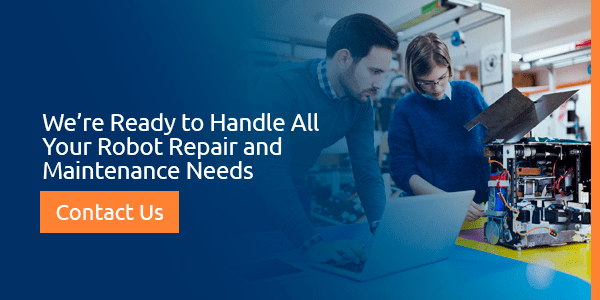Robotics
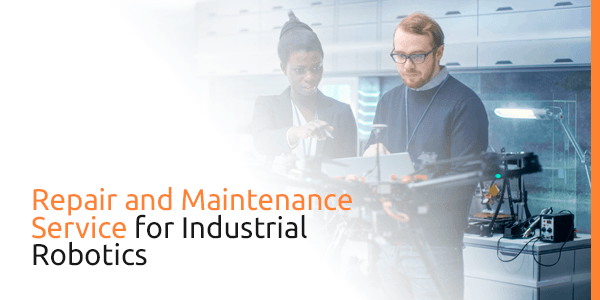
Repair and Maintenance Service for Industrial Robotics
Industrial robots can enhance your company’s operations in a number of ways, and like any type of machinery, robots require ongoing maintenance to function at peak performance. Whether you want to maintain your robotics proactively to avoid problems or you’ve run into an equipment malfunction, Global Electronic Services can help. We offer comprehensive maintenance services for industrial robots. You can trust our expert technicians to help you get the most out of your industrial robotics.
Our Fast and Affordable Industrial Robotics Repair Services
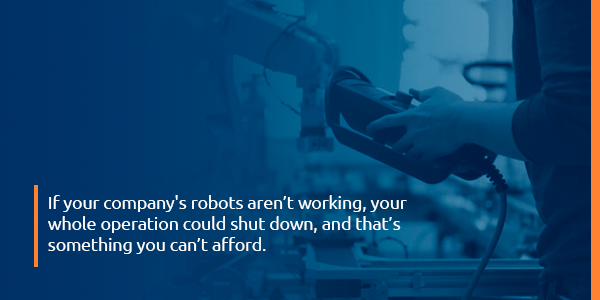
At Global Electronic Services, our repair technicians know robots. Our factory-trained and certified professionals have experience with ABB, Motoman, Fanuc, ASI Robotics and other brands, so no matter what kind of industrial robot you have and what the problem is, we’ll fix it.
Our industrial robotic repair services are incredibly thorough. We test every part, repair whatever is not working and replace what we think is likely to fail moving forward. The result is a robot that’s functioning so well, you’ll probably never realize it was broken. That’s a promise we back up with an industry-leading 18-Month In-Service Warranty.
If your company’s robots aren’t working, your whole operation could shut down, and that’s something you can’t afford. That’s why we offer a rush repair service that will have robots back in operation in a day or two. Even our standard service typically has your company’s robots fixed and ready to go in five days or less. We know that downtime is a killer in the industrial electronics world, and that’s why we work to minimize it as much as possible.
We also provide your business the best value when it comes to our robotic repair services. We start by giving you a fair and accurate estimate upfront so you know what you can expect to pay from the beginning. We stand behind our price with a Global Price Guarantee — if you can find a lower price from a competitor, we’ll beat it by 10%.
Importance of Industrial Robot Preventative Maintenance
It may be clear when you are in need of robot repair, but this shouldn’t be the only time you maintain your company’s robotics. When it comes to industrial robots, preventative maintenance is critical. It may be tempting to not make any extra efforts or expenditures to care for robots until something goes wrong with them, but this can be a big mistake for a number of reasons.
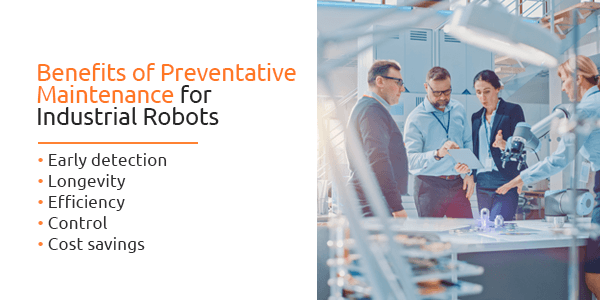
Benefits of Preventative Maintenance for Industrial Robots
There are many reasons to prioritize preventative maintenance for robotic systems. Some of the most significant benefits of preventative maintenance include:
- Early detection: First, preventative maintenance allows you to identify potential issues with industrial robots before they become big repair problems. Noticing a part is about to wear out during a basic maintenance check and quickly replacing it is much cheaper and easier than waiting for that part to fail, possibly taking other parts of the robot and whatever it is working on with it.
- Longevity:Preventative maintenance for industrial robots also allows you to extend the life of those robots dramatically. Even if nothing is obviously wrong, when a robot is poorly cared for, it may put additional stress on the machine’s parts. You may not notice it in day-to-day performance, but over time, those stresses can add up and put an end to the robot’s life long before its due.
- Efficiency: Well-maintained machines also tend to operate more efficiently. Even if your robots seem to be working without the recommended preventative maintenance, it’s likely that you’re sacrificing efficiency and spending more on operating costs. To help robots work efficiently, you need to proactively maintain them.
- Control: By doing regular preventative maintenance, you control how a robot’s repairs will affect your business. If a maintenance check reveals a problem, your company can solve the problem in stages, or fix it at a time when the robot would normally not be in operation or can have its duties replaced by another robot. This means you can dramatically reduce or eliminate downtime, preserving your productivity. Contrast that with your whole production line grinding to a halt unexpectedly.
- Cost savings: Another advantage of proactively maintaining industrial robots is that it can save you from costly repairs or replacements that may otherwise arise. Generally, preventative maintenance tasks are more affordable than emergency repairs in the case of a breakdown. Your business can also save money by avoiding unplanned downtime and keeping your operations in full swing.
Why You Should Trust a Professional for Industrial Robotic Repair
When your company schedules maintenance, it’s important to schedule it with an experienced professional who knows your brand of robot intimately and has a thorough and complete maintenance process for your particular machine.
Your staff may fully understand how to operate the industrial robots, but understanding how to maintain them is a different matter entirely. These systems can be highly complex and require maintenance technicians with the right expertise to detect potential issues and give robots the proper upkeep they need. There are routine maintenance tasks your staff can carry out, but it’s smart to trust more thorough inspections and complex repairs to the professionals.
Global Electronic Services has a time-tested and approved process for complete maintenance for all your company’s industrial robots. Our technicians can inspect and repair industrial robots in your facility so you can enjoy longer-lasting, more efficient machines and avoid inefficiency and breakdowns.
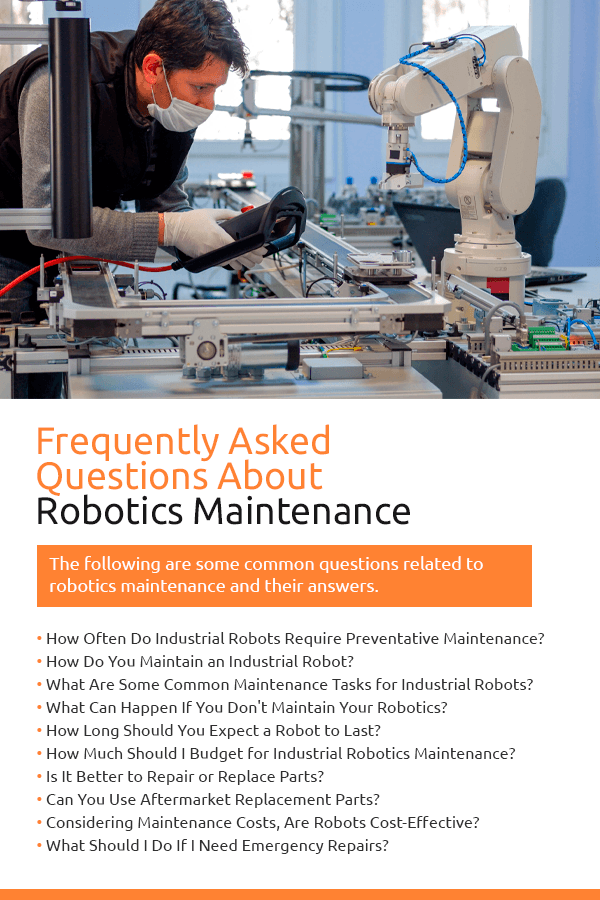
Frequently Asked Questions About Robotics Maintenance
The following are some common questions related to robotics maintenance and their answers. We are also happy to answer any questions you don’t see here.
1. How Often Do Industrial Robots Require Preventative Maintenance?
The best robotic preventative maintenance intervals are not the same for all robots. Different robotic companies will give you different time frames for when your company should do maintenance on its machines. FANUC, for example, recommends a preventative maintenance procedure every 12 months or 3,850 operating hours, whichever comes first. KUKA provides frequency recommendations for various maintenance tasks, ranging from every 5,000 hours to every 25,000 operating hours.
The best thing to do is to check the manufacturer’s recommendation for professional maintenance as soon as the robot is delivered. If your business can’t find the recommendation in the manual, call the manufacturer to find out. Whatever maintenance schedule they provide is the one you should follow. Companies can certainly schedule preventative maintenance more frequently, but they should not wait longer than the manufacturer’s recommendation to schedule maintenance tasks.
2. How Do You Maintain an Industrial Robot?
The best way to make sure your company is staying on top of all its robots’ preventative maintenance needs is to use the manufacturer’s recommendations to create a maintenance checklist. This list should include all the maintenance tasks the system requires along with how frequently you need to complete these tasks. Note whether the task is something your staff can complete internally or whether you need to hire a professional for it. When completing a maintenance task, check it off and note the date when you or the technician completed it.
It’s typically best to keep this log and maintenance schedule in a digital spreadsheet or in a maintenance software program, but workers can also use a notebook if it’s more convenient. A maintenance schedule can help your business adequately care for its robots, and the schedule may also prove valuable if you ever decide to sell any of the machines. It can back up your claim to potential buyers that a robot has been consistently well-maintained.
3. What Are Some Common Maintenance Tasks for Industrial Robots?
The maintenance tasks a robot requires will depend on the exact model and the way it is used, but some common tasks to list in a maintenance schedule include:
- Inspection: Monitor robots while in motion, paying attention to repeatability, the brake, wiring harness and cables and listening for unusual noises or excessive vibrations. Visually inspect parts like controller cables and their connections, cooling fans, safety equipment, teach pendant and power supplies. Staff members can inspect the robots, but it’s best to schedule a routine inspection with a professional who is more likely to detect possible issues.
- Bolt tightening: Look and feel for any loose external bolts and tighten them. Staff can complete this task on their own, or a technician can address these issues during a professional inspection.
- Data backup: Backing up robots’ data periodically will be helpful if your business ever experiences equipment failure. You can back up your robots’ data individually or use software to back up data for all the robots that are on the same network.
- Electrical maintenance: Minor and major electrical maintenance is an expected part of industrial robot maintenance. This is a good example of a task your company should leave to the professionals. Minor electrical maintenance should happen more frequently.
- Lubrication: Grease the joints, bushing and balancer according to the manual or check to ensure these areas are already well lubricated. This is a task your staff can likely complete.
- Battery replacement: Test the RAM and APC batteries and replace them if necessary. The controller and robot arm will stop functioning if the batteries die. This is another task your company can complete without professional help.
- Cleaning: Vents and filters can get clogged and dirty, so you need to clean them with compressed air to keep them open and functioning efficiently and replace filters when necessary. Clean other parts, as well, like light curtains and sensors.
4. What Can Happen If You Don’t Maintain Your Robotics?
In the most extreme instances, failing to properly maintain robots can result in a total equipment failure. This can bring your operations to a sudden standstill and cost your company significantly. There are also plenty of issues robots can experience short of a complete equipment breakdown that can interfere with their efficiency and functionality. Some common issues include:
- Electrical malfunctions, including damaged cords, cables and wires, which can lead to an electrical fire
- Danger to staff due to unpredictable or malfunctioning behavior
- Position deviation, where the robot does not stay within its intended perimeters
- Repeatability problems, where the robot is no longer performing repeat motions consistently
- Data loss or software breakdown, leading to a major disruption in your processes
5. How Long Should You Expect a Robot to Last?
With proper ongoing maintenance, industrial robots can last for a decade or more. It is difficult to give an exact number or range of numbers since the life span of a robot will depend on a variety of factors. The robot manufacturer may provide an idea of how long to expect the robot to last.
When it comes to manufacturer’s warranties, keep in mind that your business could forfeit the warranty by not adhering to the manufacturer’s recommendations for maintenance. This is because manufacturers understand just how critical preventative maintenance is to ensure a robot has a long, productive life. The best way to maximize a robot’s life is to give it the proper care it needs to function well and to replace parts as needed.
6. How Much Should I Budget for Industrial Robotics Maintenance?
Developing a budget for robots’ maintenance can be difficult initially. It’s best to abide by the manufacturer’s recommended maintenance schedule and note the costs as you go. Some tasks, such as tightening loose fittings, will cost nothing, while more intensive maintenance tasks that involve a professional will entail a larger cost. Of course, it helps to work with Global Electronic Services so you know your business is getting the best price on maintenance services.
By keeping track of costs over time, your company can get an idea of how much you might expect to spend in the future. For example, you could use this year’s maintenance costs to budget for next year’s expected costs. It’s important to note that maintenance costs are not necessarily consistent over time. Older equipment will likely require more frequent and extensive maintenance than newer robots, necessitating a larger maintenance budget.
7. Is It Better to Repair or Replace Parts?
Parts that have experienced a lot of wear and are no longer functioning properly will likely need to be replaced rather than repaired to help the robot function optimally.
For some part malfunctions, however, your business may have the option to either repair the part or replace it. There is no consistent answer for whether repairing or replacing parts is best. The answer will depend on exactly what has gone wrong with a part and how much it would cost to fix versus replace the part. A knowledgeable technician can help you make the best, most cost-effective decision for your situation.
8. Can You Use Aftermarket Replacement Parts?
When it comes time to replace a part, your company may be tempted to purchase aftermarket replacement parts that are either cheaper than original equipment manufacturer (OEM) parts or that claim to offer superior performance compared to their OEM equivalents.
Ask a robotic repair technician to offer guidance if there’s an aftermarket part you’re interested in using. In most cases, it’s best to stick to OEM parts when a robot needs a replacement. This ensures you’re using a direct replacement that will work properly with the machine. It can also keep the warranty intact for a robot, and the part can come with its own warranty from the OEM.
9. Considering Maintenance Costs, Are Robots Cost-Effective?
The cost of deploying robotics, including maintenance, adds significantly to the total cost of these machines. The comprehensive cost to incorporate a robot into your company’s operations could easily be triple the initial purchase cost. Considering the true cost of robotics, you may wonder whether they are worth it. The short answer for most companies is yes. Industrial robots can deliver an excellent return on investment (ROI) by enhancing operations in a number of ways, including:
- Accuracy: Robotics reduce human error, which can help maintain more consistent standards and minimize waste in manufacturing.
- Efficiency: Robots don’t need to take breaks like humans do. They can work with consistent speed and efficiency, as long as they are well maintained.
- Safety: Using robots in your operations can also make your facility safer for employees as robots can handle potentially hazardous tasks.
- Profitability: Ultimately, using robots can reduce costs, leading to increased profits. This is where the ROI becomes apparent, though in many cases, you may not realize just how much robots contribute to your company’s profitability.
10. What Should I Do If I Need Emergency Repairs?
While regular preventative maintenance can help avoid unexpected breakdowns, your business could still experience a fluke issue with your robotics that brings operations to a standstill. In these instances, you need help quickly to address the problem, minimize downtime and reduce production losses. Sometimes these breakdowns happen at the most inconvenient times, such as on a holiday or during the night.
Fortunately, Global Electronic Services is here 24/7, 365 days a year to provide emergency repair services. Just give us a call. Even if we can’t take your call right then, one of our experts will get back with you promptly. There’s no need to lose valuable time waiting on a technician to come repair a robot. Take advantage of emergency repair services to get back on track as quickly as possible.
Contact Global Electronic Services for Repair Robot Services
Don’t trust the maintenance and repair of your company’s robotics to just anyone. They’re too important. And don’t put off repairing robotics because of concerns about cost or how much time you’ll lose. Global Electronic Services is here to take all those concerns off the table. We’re ready to get your company and robots back to work. To get started, contact us online for a free quote or call us at 877-249-1701 to learn more about our services.
Additional Resources
- Manufacturing Devices That Minimize Maintenence Costs
- The Future With Robotics and Automation Manufacturing
- Guide to Inspection Robots used in Industrial Sectors
- The Rise of Robotics Competitions Is Paving the Way for Future Engineers
- Robotics for Materials Transport Inside Manufacturing Facilities: Part 1
- Robotics for Materials Transport Inside Manufacturing Facilities: Part 2

